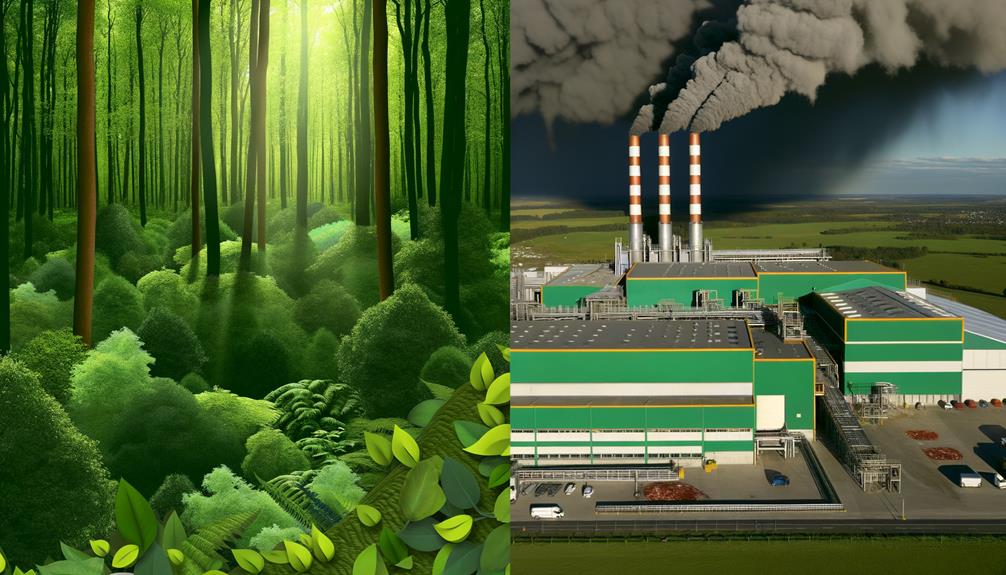Have you ever wondered how your dinner plate could be a battleground for climate change? As you consider your carbon footprint, you might not immediately think about the food you consume. Yet, what you choose to eat, particularly when it comes to meat, can have a significant impact on the environment. It turns out, a meatless lifestyle does more than just promote good health – it also helps lower greenhouse gas emissions. The process of raising livestock for meat, dairy and eggs is a major culprit in climate change, producing a significant amount of the world’s total greenhouse gas emissions. By embracing a plant-based diet, you’re not just making a choice for your own health, but for the health of our planet. But how exactly does this work? Stick around, as we take a journey through the environmental impact of our dietary choices.
Key Takeaways
- Meat production is a major contributor to greenhouse gas emissions, with livestock production alone accounting for nearly 14.5% of total emissions.
- Shifting to a plant-based diet, particularly a vegan diet, can significantly reduce carbon emissions associated with food consumption, with vegan diets having 75% less greenhouse gas emissions compared to meat-based diets.
- Vegan diets also require less land and water compared to meat-heavy diets, contributing to a more sustainable food system.
- Embracing a meatless lifestyle can help reduce the demand for animal farming and deforestation, which are significant sources of greenhouse gas emissions.
Understanding Greenhouse Gas Emissions
When it comes to greenhouse gas emissions, your dietary choices play a significant role, especially if your diet is meat-heavy. Animal agriculture is a leading contributor to these emissions. The environmental impact of meat production is substantial, generating greenhouse gases at every step, from field to fork.
Shifting your diet to be more plant-based can significantly reduce the carbon emissions associated with your food consumption. Adopting a vegan lifestyle is not just a personal choice, but a commitment to serve the planet. On average, vegan diets have 75% less greenhouse gas emissions compared to meat-eating diets. That’s a significant reduction in your individual carbon footprint!
Take note, the US has one of the highest average carbon footprints, which means there’s ample room for improvement. Your food choices have the power to create a real change. Choosing vegan alternatives over meat can help to lower the environmental impact of animal agriculture.
Impact of Livestock Farming on Emissions
Building on your food choices’ impact on carbon emissions, let’s take a closer look at how livestock farming contributes to this environmental issue. Livestock farming requires vast amounts of resources, contributing significantly to carbon emissions. The meat industry’s environmental impact is profound. It’s a significant contributor to greenhouse gases, which contribute to climate change.
Here’s why:
- Livestock production contributes to nearly 14.5% of total greenhouse gas emissions. That’s a hefty carbon footprint!
- Methane emissions associated with meat consumption originate mainly from livestock digestion. This potent greenhouse gas is 25 times more impactful on climate change than carbon dioxide.
- Animal agriculture often leads to deforestation for grazing and feed production, removing trees that absorb carbon dioxide and exacerbating the problem.
Reducing meat consumption can have a big impact. By embracing a meatless lifestyle, you’re not just serving your health, but also the planet. You’re making a choice that directly reduces the environmental impact of animal agriculture. So, next time you’re about to bite into a burger, remember the power of your food choices.
Role of Plant-based Diets in Emission Reduction
Diving into a plant-based diet can play a pivotal role in slashing greenhouse gas emissions and reducing your environmental footprint. Plant-based diets often require less land and water compared to meat-heavy diets. A vegan diet reduces the demand for animal products and thus, the greenhouse gases associated with their production.
You see, the production of meat and dairy is a leading cause of carbon dioxide emissions. In fact, meat eaters account for higher emissions compared to fish eaters, vegetarians, and vegans. By embracing plant-based diets, you can significantly reduce these emissions and decrease your environmental footprint.
Here’s a quick comparison:
| Diet | Land Use | Water Use |
|---|---|---|
| Vegan | 75% less | 54% less |
| Vegetarian | 50% less | 33% less |
| Meat-Eater | – | – |
This table makes it clear that our dietary choices have a significant role in shaping the future of our planet. Thus, a shift towards plant-based diets could be a powerful tool in our fight against climate change. It’s a personal choice with global implications.
Environmental Benefits of Veganism
You’ll find that the environmental benefits of embracing a vegan lifestyle are simply astounding, with significant reductions in greenhouse gas emissions, land use, water consumption, and biodiversity loss. Vegan diets offer a real solution to the significant environmental challenges associated with meat production. By choosing plant-based foods, you’re not just serving your health, but also serving the planet in a meaningful way.
Consider the following points:
- Vegan diets produce 75% less greenhouse gas compared to meat-based diets. This drastic reduction plays a critical role in combating climate change.
- Land use tied to meat production has detrimental environmental impacts. However, when it comes to vegan diets, they require 75% less land, contributing to a more sustainable food system.
- Water consumption drops by 54% when you embrace a vegan lifestyle, another significant environmental benefit that can’t be overlooked.
The global food system is under immense pressure, and every choice you make has a ripple effect. By adopting vegan diets, you’re making positive impacts that go beyond your plate, contributing to a more sustainable and resilient food system. Remember, each meal is an opportunity to combat climate change and reduce the environmental impacts of our food choices.
Meatless Lifestyle and Climate Change
Having seen how veganism benefits the environment, let’s now explore how a meatless lifestyle can directly impact climate change. Your diet choices can be a significant contributor to greenhouse gas emissions. A meatless lifestyle can dramatically reduce these emissions. A majority of the emissions come from animal farming, which requires vast amounts of land and water. Deforestation to create more farmland also adds to the greenhouse gas emissions.
Switching to plant foods helps reduce the demand for animal farming and subsequently, the deforestation and greenhouse gas emissions associated with it. As a bonus, you’re also contributing to global food security as more food can be grown on less land when we opt for plant-based diets.
Moreover, meat production is a significant source of methane emissions, a potent greenhouse gas. By choosing a meatless lifestyle, you’re helping curtail these emissions, making a direct impact on climate change.
Frequently Asked Questions
Why Does Not Eating Meat Reduce Your Carbon Footprint?
By ditching meat, you’re reducing livestock methane and meat industry pollution. Your food waste lessens, you promote sustainable farming, save water, and boost land use efficiency. It’s a win for forest conservation and oceans too.
How Does Being a Vegan Reduce Carbon Footprint?
By choosing vegan, you’re drastically lowering carbon emissions. This sustainable living choice benefits the environment through resource conservation, reducing food waste, and mitigating climate change. It’s a massive leap towards better health and environmental ethics.
How Does Going Meatless Affect the Environment?
By going meatless, you’re conserving water, reducing deforestation, boosting energy efficiency, and preserving biodiversity. You’re also minimizing land usage, promoting ocean health, animal welfare, and sustainable agriculture, while improving food security and your health.
What Are the Environmental Benefits of Eating Less Meat?
By reducing meat intake, you’re promoting water conservation, lowering methane emissions, and combating deforestation. This lifestyle shift supports biodiversity, improves ocean health, increases energy efficiency, and fosters sustainable farming. So, it’s not just good for you, but the planet too.







